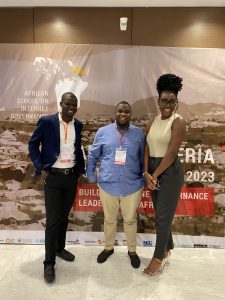Share the post "Shaping global digital transformation: Applying the African School on Internet Governance 2023 learnings"

By Mark Mulobi
Introduction
In today’s fast-paced world, digital transformation has become a catalyst for economic growth, innovation and improved quality of life globally. Africa is no exception to this prevailing trend. Recently, I had the privilege of attending the 11th African School on Internet Governance (AfriSIG 2023) in Abuja, Nigeria. Alongside experts, policy makers and fellow participants, we explored critical topics like internet governance, data governance, and spearheading digital transformation in the African context. This transformative experience has equipped me with invaluable insights to help shape an inclusive, ethical digital future for the continent and beyond. In this blog, I will share key learnings from AfriSIG 2023 and how I aim to apply them through my work at the Digital Impact Alliance (DIAL).
People-centred digital transformation
AfriSIG 2023 emphasised adopting a human-centric approach to digital transformation. Such an approach should transcend borders and be central to digital strategies globally. When executed thoughtfully, digital transformation can enrich lives worldwide. Any strategy must have human impact at its core. Technology should serve to uplift people and communities. AfriSIG 2023 drove home this vital tenet, urging us to look beyond technology for its own sake and focus on its implications for society.
During the conference, I gained a deeper appreciation that one-size-fits-all approaches often fail. Diverse populations have unique needs, values and norms. Effective digital strategies require carefully assessing local contexts and cultures. For instance, improving digital literacy means understanding how to make technology truly accessible and relevant across generations, genders, languages and more. A human-centred mindset demands recognising and embracing nuances.
As DIAL notes, context-specific approaches enable more inclusive digital access and participation. By adapting platforms, content and outreach, marginalised groups can better leverage technology to improve their lives. A key takeaway from AfriSIG 2023 was that progress requires contextualising digital transformation to local needs – for example, by reflecting on and implementing the practicum document our group developed as a tailored guide for stakeholders to apply the African Union Data Policy Framework in real world contexts. I aim to integrate this learning through DIAL’s work like the Africa Data Leadership Initiative (ADLI), a peer learning and exchange network designed by and for African policy makers, legislators, researchers, technologists and digital rights advocates working on data governance and digital platforms and services.
Responsible data governance
Responsible data governance was a prominent theme at AfriSIG 2023, highlighting the need for comprehensive data policies and ethical practices. As emerging technologies generate vast amounts of data, judicious governance is essential to maintain public trust while enabling innovation.
DIAL’s extensive research on data governance, exchange and consent provides models that can be adapted in the African context to balance benefits and risks. By taking a holistic, user-centric approach spanning technology, policies, institutions and capacity building, DIAL aims to enable responsible data exchange across sectors. As part of this mission, I look forward to championing this with DIAL on governance best practices and informing policy discussions to shape an ethical data ecosystem across Africa.
DIAL is well-positioned to champion this systemic view on data – leveraging research, convening power and on-ground experience to advance sustainable models for exchange. My learnings from AfriSIG 2023 will inform DIAL’s work of harnessing data responsibly for social impact.
Translating AfriSIG 2023 learnings into action
I am excited to translate AfriSIG 2023’s insights into impactful strategies at DIAL. By collaborating on digital inclusion programmes, informing policies and sharing knowledge, I aim to apply these lessons to advance DIAL’s mission. My learnings will also inform DIAL’s work on data governance, data exchange, consent and beyond to drive ethical and inclusive digital transformation.
In closing, our global digital future holds tremendous potential to enrich lives. But we must work collectively to shape it responsibly. My time at AfriSIG 2023 has reaffirmed the power of coming together across borders and sectors to achieve progress. I look forward to channelling these lessons to help build a brighter, more empowering digital tomorrow for all. Stay tuned for more updates as I report back from the digital transformation frontlines!
Mark Mulobi is a monitoring, evaluation, research and learning consultant for the Digital Impact Alliance (DIAL) of the United Nations Foundation (UNF). He is part of the team that helps bridge the gap of digital inclusiveness, using evaluation to better the lives of others and ensure that no one is left behind in the world. Currently, Mark is supporting research at DIAL on Digital Public Infrastructure (DPI) and the intersections of DPI and climate, gender, and data governance. He is also supporting work on data exchange and consent.
